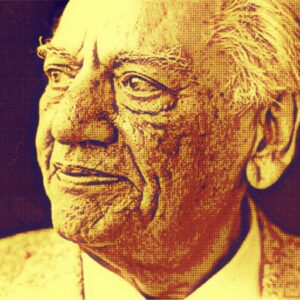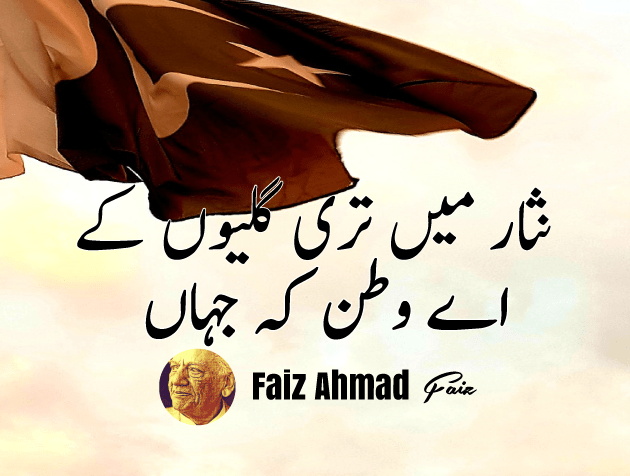Introduction
Faiz Ahmad Faiz was a renowned Urdu poet, writer, and political activist from Pakistan. On February 13, 1911, he was born in Sialkot, British India (now in Pakistan). One of the most famous Urdu poets of the 20th century, Faiz is renowned for his poems about love, social justice, and political struggle. His writings frequently reflect his political and social convictions. He was also a strong supporter of social justice and human rights. In addition to receiving countless other honors and prizes for his contributions to literature and politics, Faiz received the Lenin Peace Prize in 1962. Although he passed away on November 20, 1984, his influence on Urdu writing and political activism is still felt today.
Faiz Ahmad FaizEarly Life and Education
Faiz Ahmad Faiz received his early education in Lahore and completed his Bachelor of Arts degree from Government College University in Lahore. He later went on to study at the University of Punjab, where he received his Master of Arts degree in Arabic. Faiz also received a scholarship to study at the University of Cambridge in the United Kingdom, but he was unable to pursue it due to personal reasons. Despite this, he was well-versed in several languages, including Urdu, English, Arabic, and Persian. Throughout his life, Faiz continued to pursue his love of learning and knowledge, and his education and cultural background played a significant role in shaping his views and his works.
A Career in Literature:
Faiz Ahmad Faiz’s career in literature spanned several decades and he is widely regarded as one of the greatest Urdu poets of the 20th century. He began writing poetry while still in college and quickly gained recognition for his unique style and themes. Faiz’s works are known for their deep sensitivity to the human condition, and his poems often reflect his love for humanity, his concern for social justice, and his political activism.
Faiz’s early poetry was influenced by classical Urdu poetry, but he later developed a more modern style that incorporated elements of Western literature and poetry. Throughout his career, he published numerous collections of poetry, including “Dast-e Saba”, “Zindan Nama”, and “Nuskha-i Hasan”. His most famous collection of poetry, “Dast-e Saba”, was published in 1957 and is considered one of his best works. In addition to his poetry, Faiz was also a prolific writer of prose and was known for his political and social essays, including “Mazamin-i Faiz” and “Mualim-i Zaman”. He was a member of the Communist Party of India and was a vocal advocate for human rights and social justice.
Faiz’s political activism resulted in several periods of imprisonment, including a four-year sentence during the martial law regime of General Zia-ul-Haq in Pakistan. Despite these setbacks, Faiz continued to write and publish his works, and his literary and political legacy continues to inspire people around the world.
Famous Works of Faiz Ahmed Faiz
Faiz Ahmad Faiz is one of the most well-known Urdu poets of the 20th century and has produced a substantial body of work over the course of his career. Some of his most famous works include:
- Dast-e Saba – This collection of poetry, published in 1957, is considered one of Faiz’s best works and includes some of his most famous poems, such as “Mujh se pehli si mohabbat”.
- Nuskha-i Hasan – This collection of poems was published in 1948 and includes some of Faiz’s most political works, such as “Subh-e Azadi” and “Bol”.
- Zindan Nama – This collection of poems was written while Faiz was imprisoned during the martial law regime of General Zia-ul-Haq in Pakistan and reflects his thoughts and experiences during that time.
- Mazamin-i Faiz – This collection of essays was published in 1959 and includes some of Faiz’s thoughts and observations on political and social issues.
- Mualim-i Zaman – This collection of essays was published in 1963 and includes some of Faiz’s reflections on his life and his role as a political activist.
These are just a few of the many works produced by Faiz Ahmad Faiz over the course of his career, and his contributions to Urdu literature.
Famous Poems
Faiz Ahmad Faiz is known for his many famous poems, which continue to be widely read and admired by people around the world. Some of his most famous poems include:
- Mujh se pehli si mohabbat
- Subh-e Azadi
- Bol
- Hum Dekhenge
- Nashad
- Tum Aaye Ho
- Sar-e Waadi-e Sehar
- Shaam-e Firaq Ab Na Pooch
- Aaj Bazaar Mein
- Lekin
These poems are widely recognized as some of the finest examples of Urdu poetry.
Awards and Recognitions
Faiz Ahmad Faiz was awarded several awards and recognitions for his contributions to Urdu literature and poetry. Some of his most notable awards and recognitions include:
- Lenin Peace Prize (1963)
- Sitara-i-Imtiaz (Star of Excellence) (Pakistan, 1979)
- Lotus Prize for Literature (1983)
- Faiz Ahmed Faiz International Festival (held annually in Lahore, Pakistan)
- Faiz Ahmad Faiz Chair at Lahore University of Management Sciences (LUMS)
- Faiz Ahmad Faiz Library at the National College of Arts (NCA) in Lahore, Pakistan
- Faiz Ahmad Faiz Museum in Lahore, Pakistan
These honors show how well-regarded Faiz is throughout the world, and his influence on Urdu poetry and literature is still felt today.
Social and Political Views
Faiz Ahmad Faiz was a renowned poet and intellectual who had strong social and political views. He was an outspoken critic of dictatorship and oppression and was a champion of human rights and freedom. In his poetry, Faiz often expressed his opposition to imperialism, tyranny, and inequality, and he was a strong advocate for the rights of marginalized and oppressed communities. He was also a strong advocate for democracy and freedom of expression, and his poetry reflects his commitment to these values. In addition to his literary work, Faiz was also politically active, and he was associated with the Communist Party of Pakistan. He was arrested several times for his political activities, including during the martial law regime of General Zia-ul-Haq. Overall, Faiz’s social and political views were shaped by his strong commitment to justice, freedom, and equality, and his poetry remains an important statement on these issues.
Later Life and Death
Faiz Ahmad Faiz was born in 1911 and lived until 1984. During his later life, he continued to write poetry and engage in political activism. In the late 1970s and early 1980s, Faiz suffered from ill health, and he eventually passed away on November 20, 1984, in Lahore, Pakistan. He was buried in the city of Hazuri Bagh. Faiz’s death was widely mourned in Pakistan and beyond, and his poetry remains widely read and highly regarded to this day. He is remembered as one of the greatest poets of the 20th century, and his work continues to inspire new generations of artists, writers, and activists.
Conclusion
Faiz Ahmad Faiz was a highly influential poet, intellectual, and political activist who left a lasting impact on Pakistani culture and society. Born in 1911, during a time of enormous upheaval and change in South Asia, his poetry reflects these events and his dedication to social justice. Faiz was well-known for his lyrical, forceful poems that spoke out against injustice, imperialism, and inequity throughout his whole life. He was a strong supporter of freedom and human rights and a loud opponent of authoritarianism. His writing is still well-read and respected, and it continues to influence future generations of activists, authors, and artists.


















